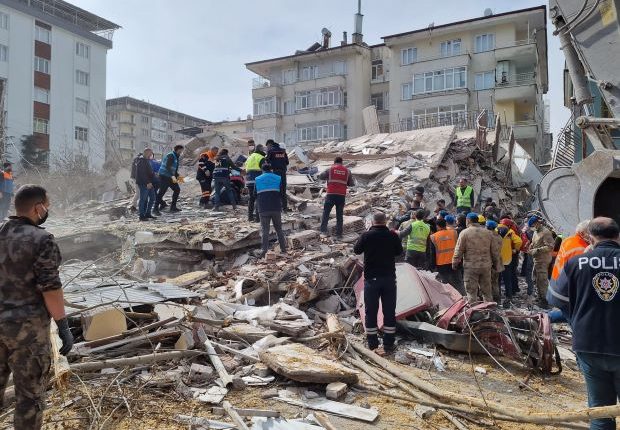New earthquake strikes Turkey, rattling an already devastated region

By Ben Hubbard and Gulsin Harman
ISTANBUL — A 5.2-magnitude earthquake struck southern Turkey on Monday (27), killing at least one person and trapping others in collapsed buildings three weeks after a devastating quake struck the same region, leaving more than 50,000 people dead in the country and in neighbouring Syria.
The latest quake struck just after noon Monday, south of the city of Malatya, according to the US Geological Survey. Malatya is the capital of the province of the same name, one of 11 Turkish regions affected by the Feb. 6 tremor.
Yunus Sezer, the head of Turkey’s emergency response agency, said at least one person had been killed and 69 injured in the latest quake. He urged people in the affected region not to enter damaged buildings for fear of aftershocks or further collapses. The agency said 29 buildings in Malatya had collapsed and five people had been rescued from the rubble. Rescuers were also searching for survivors from seven other buildings.
One previously damaged building collapsed, trapping in the rubble a father and daughter who had returned to their apartment to collect their belongings in the town of Yesilyurt, near the new quake’s epicentre, according to Haberturk TV, which was broadcasting from the scene. Both father and daughter were later rescued.
In the town of Dulkadiroglu, in the hard-hit province of Kahramanmaras, six workers who had returned to their metal workshop to retrieve kitchenwares were still inside when the quake hit, according to Haberturk. One of the men was killed, four others were injured and one escaped unscathed.
The temblor Monday was the latest to shake the fault-crossed region since the powerful 7.8-magnitude quake on Feb. 6, which was followed by a powerful aftershock hours later. The original earthquake and aftershock ravaged the region, toppling more than 100,000 buildings and leaving more than 1 million people homeless in Turkey alone.
The quake also devastated communities across the border in Syria, striking an area where 12 years of civil war had already damaged many buildings and where millions of displaced people had already been living in a humanitarian crisis.
The overall death toll has climbed steadily over the past three weeks, surpassing 50,000 in Syria and Turkey by Monday. Turkey, where the original earthquake was centered, has reported 44,374 deaths and the toll in Syria is at least 6,000, according to the United Nations.
In Turkey, the quake has led to intense scrutiny of building practices and of the government checks put in place to make sure that buildings can withstand the shaking. The government has investigated more that 550 people suspected of ties to collapsed buildings and some of them have been detained.
Residents of the quake zone have also criticized the government of President Recep Tayyip Erdogan for what they say was a late response in getting rescue workers to affected areas to pull survivors from the rubble and give aid to displaced families.
In Syria, the earthquake response was hindered by divided areas of control created by the country’s civil war. The affected area included the cities of Aleppo and Latakia, which are under the authoritarian government of President Bashar Assad, as well as territory controlled by Turkish-backed forces that have sought to overthrow the president.
Aid, even from the United Nations, was slow to enter rebel-controlled parts of Syria, but the needs have helped thaw, at least temporarily, relations between Assad and some of his Arab neighbours.
Much of the West considers Assad a pariah over the government’s actions in the civil war, including using chemical weapons against its own people, imposing starvation sieges and launching indiscriminate bombings of residential areas.
Most Arab countries, too, cut ties with Assad early in the war, and some actively supported the rebels who wanted to end his regime. But some of those countries have mended ties and even sent officials to visit Assad in the quake’s aftermath.
Foreign Minister Sameh Shoukry of Egypt met with Assad in the Syrian capital, Damascus, on Monday, the first such trip by Egypt’s top diplomat since the war in Syria began in 2011.
“The goal of the visit is primarily humanitarian, and to pass on our solidarity — from the leadership, the government and the people of Egypt to the people of Syria,” Shoukry told reporters.
-New York Times


Comments are closed, but trackbacks and pingbacks are open.